The media landscape in Bangladesh has transformed significantly in recent years, with ownership increasingly concentrated among business conglomerates and individuals with political ties. This shift has raised concerns about the independence of journalism, with corporate and political interests often influencing media narratives. As of 2023, Bangladesh boasts 45 private television channels, 28 FM radio stations, 32 community radio stations, 1,248 daily newspapers, and over 100 online news portals. While this points to a seemingly vibrant media sector, a closer look reveals the growing dominance of political elites and business moguls who use media ownership to advance their agendas, curbing press freedom in the process.
Key Sectors Dominating Media Ownership
Concentration of Ownership
According to an analysis by the Centre for International Media Assistance (CIMA), ownership of major media outlets in Bangladesh is concentrated among 32 business entities, controlling 48 of the largest media organizations. This concentration poses significant risks to the integrity of journalism and the principle of press freedom. The following graph illustrates the concentration of media ownership among these sectors:
Graph 1: Media Ownership Concentration by Sector
Figure Description: The graph indicates the distribution of media ownership across various sectors, showing the dominance of real estate (30%), pharmaceuticals (20%), textiles (15%), and banking (10%).
Sectoral Breakdown of Media Ownership in Bangladesh
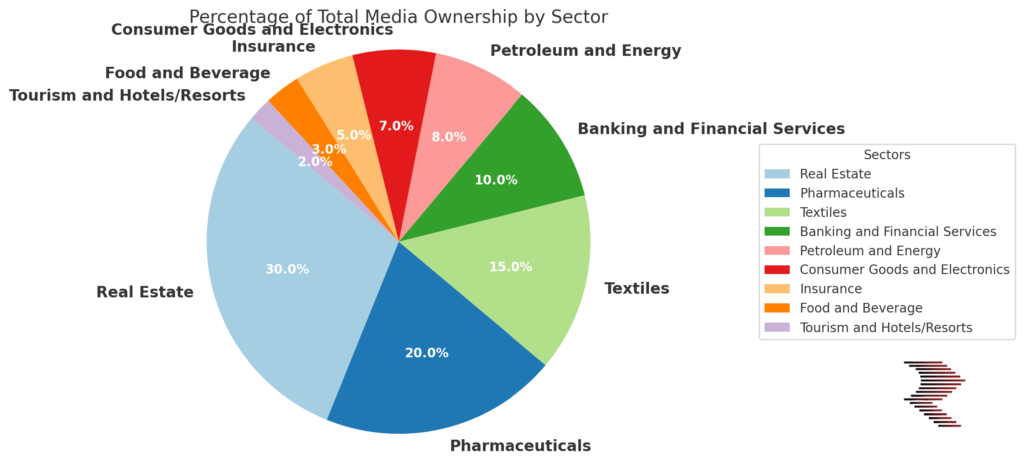
Photo: This pie chart illustrates the distribution of media ownership across various sectors. Real Estate holds the largest share at 30%, followed by Pharmaceuticals at 20% and Textiles at 15%. Other sectors, including Banking and Financial Services, Petroleum and Energy, and Consumer Goods, each contribute to the media landscape, reflecting diverse industry influences on media ownership.
Key Features of Media Ownership Patterns
- Nepotism: Many media outlets are managed by family members of business conglomerate owners, ensuring that coverage aligns with the owners’ interests. This is evident in several major outlets where familial ties influence editorial decisions.
- Political Affiliations: Media owners often have close ties to political parties, which can influence licensing processes and use media outlets as political mouthpieces. The connection with the ruling government significantly affects whether an outlet receives a license, contributing to a media environment that lacks diversity of thought.
- Cross-Sector Influence: Business conglomerates with vast interests in banking, real estate, energy, and insurance dominate media ownership, raising concerns that media outlets are being used to advance business interests while securing political favours.
Business Tycoons’ Influence on Media
Dhaka’s media outlets are no longer owned and run predominantly by individuals with journalistic backgrounds. Instead, they have been acquired or heavily funded by wealthy industrialists with deep financial stakes in non-media sectors. The top industries owning media houses include:
- Real Estate and Construction: These sectors dominate the media scene. Their significant media ownership allows them to control narratives around urban development, manage public opinion on controversial projects, and minimize negative coverage on issues such as environmental degradation, land acquisition disputes, and irregularities in building permits. Real estate developers often use their media influence to showcase new projects in a favorable light, drown out opposition from civil society, and secure favorable regulatory conditions.
- Pharmaceuticals: Second on the list, the pharmaceutical industry leverages its media influence to shape discussions around healthcare policies, drug pricing, and regulation. Their control over media helps in steering public sentiment, especially concerning issues of healthcare access and medical products, ensuring minimal scrutiny on pricing strategies or the efficacy of certain medications.
- Textiles and Garments: The textile industry, which forms the backbone of Bangladesh’s economy, has a vested interest in controlling media to promote a positive image, especially in the international sphere. Ownership of media outlets enables them to suppress coverage on labor rights violations, low wages, or the poor working conditions often associated with garment factories in Bangladesh.
Black Money’s Role in Journalism
One of the most concerning trends in Dhaka’s media ownership is the increasing presence of black money — unaccounted-for wealth that is derived from illegal activities, including tax evasion, corruption, and money laundering. This illicit capital has seeped into the media sector, enabling individuals with dubious financial backgrounds to establish control over media outlets. This raises significant ethical concerns, as the presence of black money in journalism creates an atmosphere where objectivity and editorial independence are at risk.
Why is black money attracted to the media sector?
- Influence Over Public Opinion: Media ownership offers individuals with unregulated funds the power to influence public opinion. By owning or heavily financing a media outlet, black money holders can promote their political or business interests, cover up their financial misdeeds, and control the flow of information. They can suppress stories that might expose their illicit activities while promoting content that serves their interests.
- Political Connections: Black money holders often have strong ties to political elites, and owning media outlets allows them to wield influence over politicians. Media platforms can serve as a tool to support favored political candidates or parties, skewing public perceptions during elections. These outlets often avoid investigating or reporting on corruption or criminal activities of the wealthy and influential.
- Business Cover-Ups: Many businesses, particularly in the real estate and pharmaceutical sectors, use media ownership to cover up or soften reporting on regulatory violations, environmental damages, or unethical business practices. For example, real estate moguls involved in illegal land grabs or construction violations might own media outlets that will ensure that such stories are not widely covered or that the tone of coverage is diluted.
How Black Money Affects Journalism in Bangladesh
- Loss of Editorial Independence: Journalists working in outlets owned by black money holders face tremendous pressure to avoid reporting on topics that could harm their owner’s interests. Investigative journalism, especially when it involves political corruption, environmental issues, or corporate malfeasance, is often stifled. Reporters may find themselves self-censoring, knowing that critical stories could lead to repercussions from owners or advertisers linked to black money.
- Distorted News Priorities: Rather than focusing on stories of public interest, media outlets may prioritize content that aligns with the business or political interests of their owners. Important national issues like poverty, inequality, and human rights violations may receive minimal coverage, while trivial or entertainment-oriented news takes precedence, further eroding the quality of public discourse.
- Political Bias and Manipulation: Many media houses owned by black money holders are heavily politically biased. They use their platforms to attack political opponents, promote partisan agendas, and influence election outcomes. This biased reporting undermines democracy and prevents citizens from receiving unbiased, fact-based information to make informed decisions.
- Undermining of Press Freedom: As black money continues to flow into the media sector, press freedom in Bangladesh is increasingly at risk. Journalists who attempt to report on sensitive issues often face threats, harassment, and intimidation. In some cases, journalists have been arrested, assaulted, or even disappeared for covering topics that are politically or economically inconvenient for media owners.
The Way Forward
Addressing the growing dominance of business elites and black money holders in Dhaka’s media landscape requires urgent reforms:
- Stricter Regulation on Media Ownership: The government must introduce and enforce laws that restrict the concentration of media ownership in the hands of individuals from non-media sectors. There should be transparency in media ownership, and steps should be taken to limit the influence of businesses whose primary interests are outside journalism.
- Financial Transparency in Media Funding: Media companies should be required to disclose their sources of funding. This would make it more difficult for individuals with black money to invest in or control media outlets without public scrutiny.
- Support for Independent Journalism: Civil society, NGOs, and international organizations should support independent journalism initiatives that operate free from the influence of corporate or illicit interests. Funding for investigative journalism, which is often the first to suffer under black money ownership, is critical.
Major Media Outlets, Owners, and Influence Sectors
The table below highlights some of the major media outlets in Bangladesh, their owners, industries, and political affiliations:
| Media Outlet | Owner/Company | Sector | Political Ties |
| RTV | Morshed Alam | Real Estate, Construction | Awami League MP |
| Gazi TV | Golam Dastagir Gazi | Textiles & Garments | Awami League MP |
| Mohona TV | Kamal Ahmed Majumder | Real Estate | Awami League MP |
| Jamuna TV | Jamuna Group (Salma Islam) | Real Estate, Retail | Awami League MP, Jatyo Party also |
| Independent TV | Beximco (Salman F Rahman) | Pharmaceuticals, Banking | Awami League (Advisor to PM) |
| Channel 24 | Ha-Meem Group (AK Azad) | Textiles, Apparel | Close ties to Awami League |
| Samakal | Ha-Meem Group (AK Azad) | Textiles, Apparel | Close ties to Awami League |
| Somoy TV | Fazlur Rahman (City Group) | Consumer Goods, Food Products | Connected to ruling govt. |
| Ajker Patrika | US-Bangla Group | Aviation, Real Estate | Multiple allegations, political favors |
| East West Media Group | Sayem Sobhan Anvir | Real State and various sectors | Close to Political Figures |
| Duronto TV | Shahriar Alam | Textiles | Awami League MP |
| Prothom Alo | Latifur Rahman (Transcom) | Pharmaceuticals, Consumer Goods | Indirect Influence |
| Channel i | Faridur Reza Sagar | Media, Consumer Goods | Close Government Ties |
Media Outlets in Focus
Jamuna TV
Jamuna TV, owned by Salma Islam, is part of the Jamuna Group, a conglomerate with major stakes in real estate, retail, and construction. While the channel has a reputation for being outspoken and has critically covered issues like government inefficiency, it has not been free from political pressure. For instance, during the 2018 parliamentary election, Jamuna TV was temporarily suspended by the government, allegedly because it aired content critical of the ruling Awami League. Salma Islam, a former MP of the Awami League, has navigated both political and business interests, with her media outlet frequently caught between government pressure and its role as a watchdog.
Independent TV
Owned by Salman F Rahman, a prominent business magnate and advisor to the former Prime Minister Sheikh Hasina, Independent TV is part of the Beximco Group, one of the largest conglomerates in Bangladesh. Beximco has interests in pharmaceuticals, banking, real estate, and energy. As a close ally to the ruling Awami League, Salman F Rahman’s media outlet has often been seen as politically aligned, softening its stance on government criticism. However, during times of intense political turmoil, Independent TV has maintained some level of investigative journalism, but its credibility is frequently questioned due to the owner’s deep political ties.
Channel 24 and Samakal (Ha-Meem Group)
Both Channel 24 and the daily newspaper Samakal are owned by AK Azad, the chairman of the Ha-Meem Group, one of Bangladesh’s largest garment manufacturers. Ha-Meem Group’s influence stretches across the textiles industry, and AK Azad himself is a key player with close ties to the Awami League. These media outlets have been criticized for being aligned with the government’s interests, with editorial decisions reportedly influenced by the owner’s political affiliations. Channel 24’s news coverage is often perceived as government-friendly, particularly when it comes to sensitive topics like labor rights and worker conditions, which could impact the owner’s other business ventures in the garment industry.
Somoy TV (City Group)
Somoy TV is owned by Fazlur Rahman, who chairs City Group, a leading conglomerate involved in consumer goods, food products, and commodities trading. Somoy TV has built a reputation as one of the more independent news channels, frequently covering politically sensitive topics, but it is not entirely immune to government influence. Like many other outlets, Somoy TV has faced accusations of toning down its criticism of the ruling party in exchange for favorable business deals.
Political Influence on Media Licenses
The process for granting media licenses in Bangladesh has long been viewed as a political tool. During the tenure of former Prime Minister Sheikh Hasina (from 1996-2001 and again from 2009 to August 5, 2024), over 40 TV licenses have been issued, primarily to individuals and companies closely associated with the ruling Awami League. In contrast, during the Bangladesh Nationalist Party (BNP) administration from 2001-2006, only five licenses were issued. The heavy politicization of media licenses creates an environment where media ownership is tightly linked to political favoritism, reducing diversity in media voices and concentrating power in the hands of a few.
Graph 1: TV Licenses Issued by Government Tenure
(A graph showing the sharp rise in TV licenses issued during Awami League administrations compared to BNP rule)
The Business-Politics Nexus: Corruption and Conflicts of Interest
Many business conglomerates that own media outlets are linked to widespread corruption and conflicts of interest. Some of the industries tied to media ownership, such as banking, real estate, and energy, have been involved in major scandals. For instance:
- Bashundhara Group, which owns East West Media Group, has been involved in multiple controversies, including land-grabbing scandals. The group’s media outlets, such as the Bangladesh Pratidin, often avoid covering stories critical of their business dealings.
- Ha-Meem Group, owners of Samakal and Channel 24, are a major player in the textile industry. There have been reports of editorial content being influenced to avoid criticism of labor practices in the garment sector, one of the group’s key industries.
- US-Bangla Group, linked to Ajker Patrika, has faced scandals related to aviation safety and questionable real estate projects. Investigative reports into these activities are rarely found in media outlets owned by such conglomerates.
Graph 2: Reported Incidents of Journalist Harassment (2023)
(A line graph showing the rise in incidents of journalist harassment and violence, particularly around sensitive stories linked to business or political elites)
Case Studies of Political Influence and Censorship
- Ekushey Television (ETV): This outlet has been shut down multiple times, depending on the political party in power. The closures reflect the fragility of media freedom when tied to political interests.
- Jamuna TV: Owned by the Jamuna Group, this station was temporarily suspended in 2018 for its critical coverage during the national elections. The media tycoons involved in the elections used their outlets to shape public opinion, often at odds with competitors.
- Gemcon Group: The group has reportedly used its media influence to suppress coverage of protests and labor disputes, particularly those affecting its businesses.
Journalist Safety and Repression
The situation for journalists in Bangladesh has deteriorated significantly in recent years. Between January and October 2023, according to Ain o Salish Kendra (ASK) and the Committee to Protect Journalists (CPJ), 260 journalists faced harassment, and one journalist was murdered. The killing of Golam Rabbani Nadim in 2023, who was investigating illegal activities by local political figures, underscores the dangers faced by investigative journalists. Media outlets owned by business elites with political affiliations often downplay or avoid coverage of such incidents to protect their interests.
Graph 3: Incidents of Harassment and Attacks on Journalists (2023)
Impact on Journalism and Freedom of the Press
The concentration of media ownership in the hands of a few business elites and politically connected individuals has had a profound impact on press freedom in Bangladesh. Journalists working for these outlets often face pressure to align coverage with the interests of the owners. This results in self-censorship, biased reporting, and a significant erosion of public trust in media outlets.
The Future of Independent Media in Bangladesh
The increasing concentration of media ownership among politically connected business elites raises serious concerns about the future of free and independent journalism in Bangladesh. Without significant reforms, the media will likely continue to serve as a tool for advancing personal, political, and business interests, rather than acting as a platform for public discourse and accountability.
Urgent reforms are needed to protect editorial independence and improve journalist safety. Until these changes are implemented, the media landscape in Bangladesh will remain heavily influenced by a combination of political patronage and corporate interests, leaving little room for independent and critical journalism.


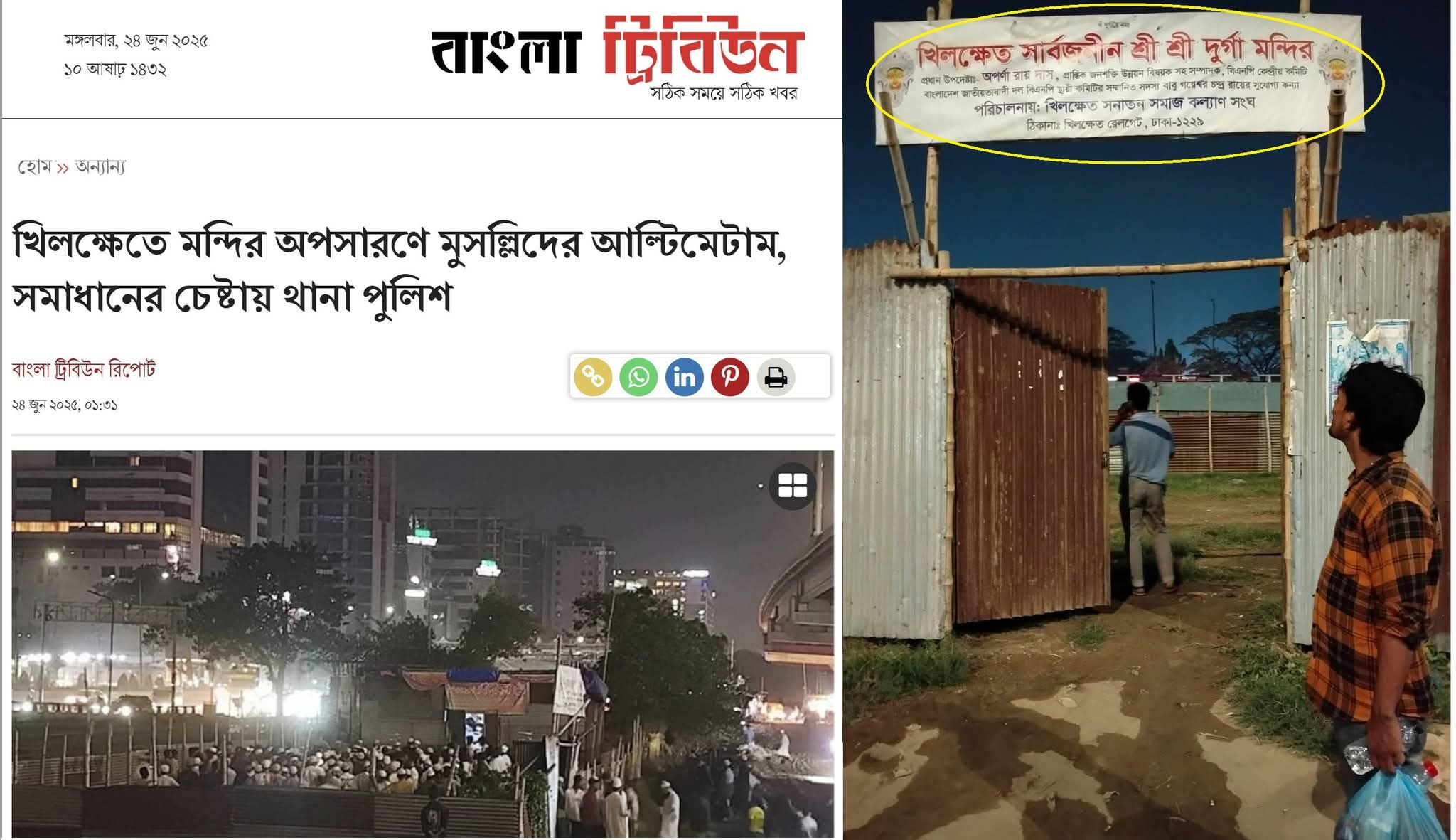
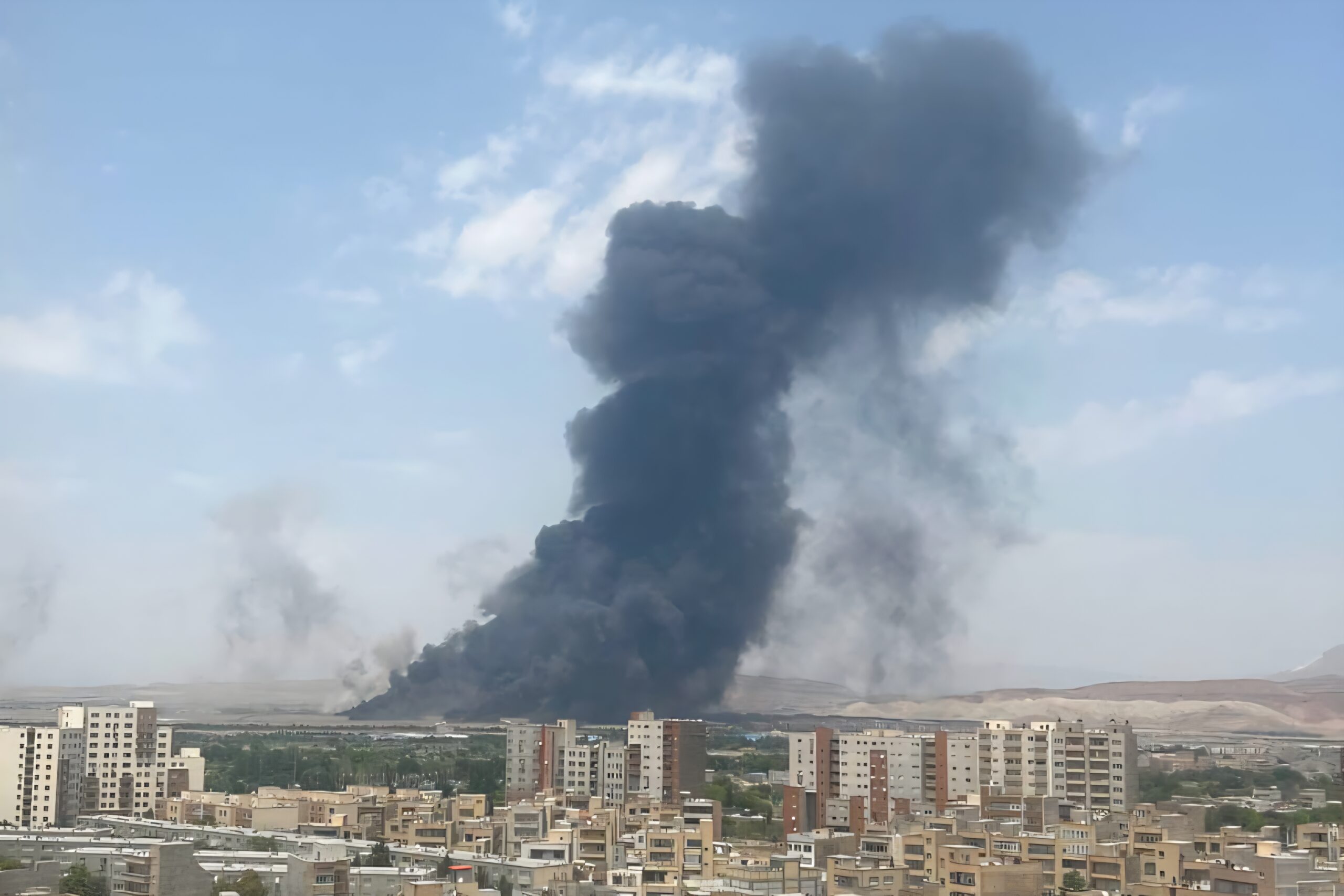
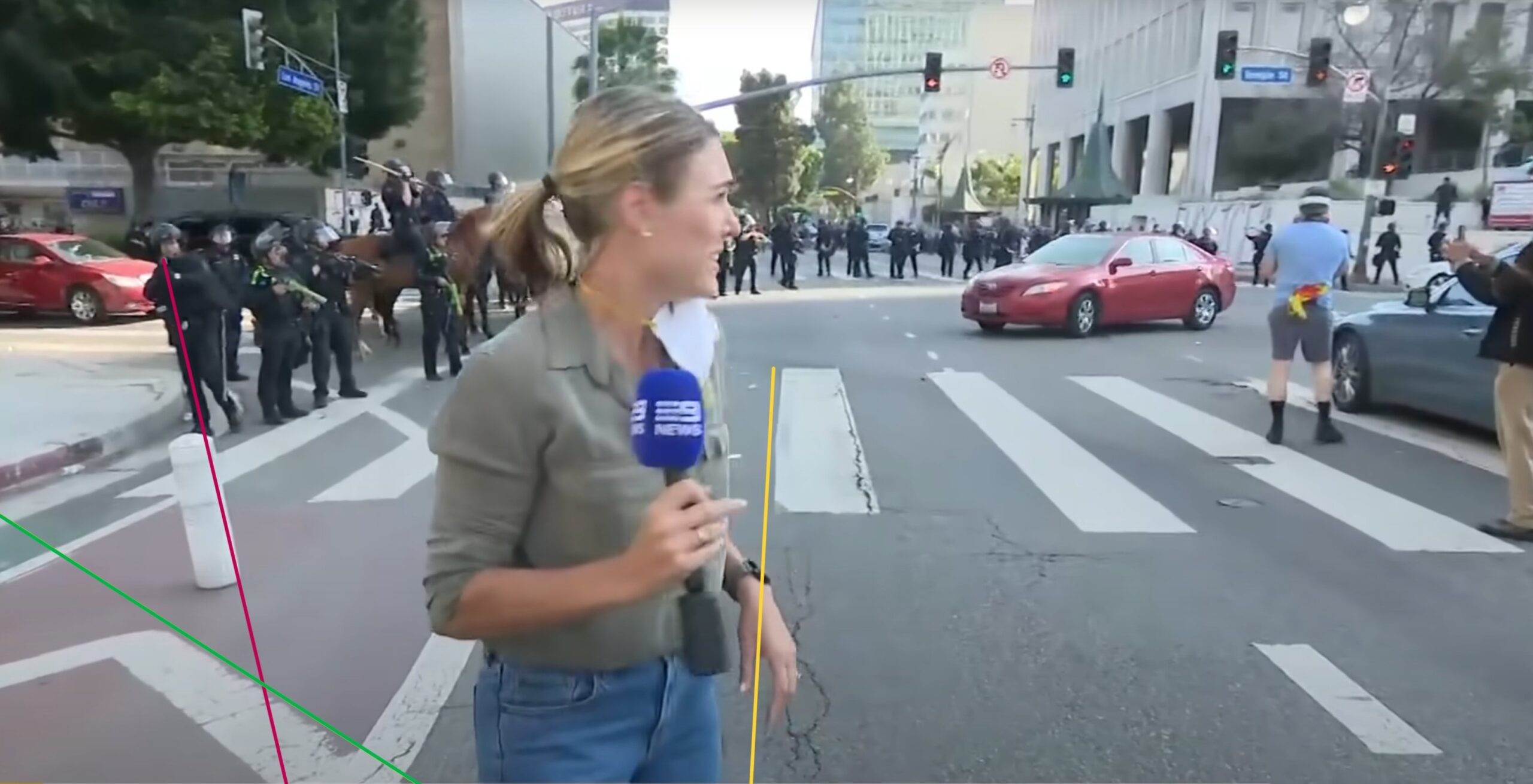
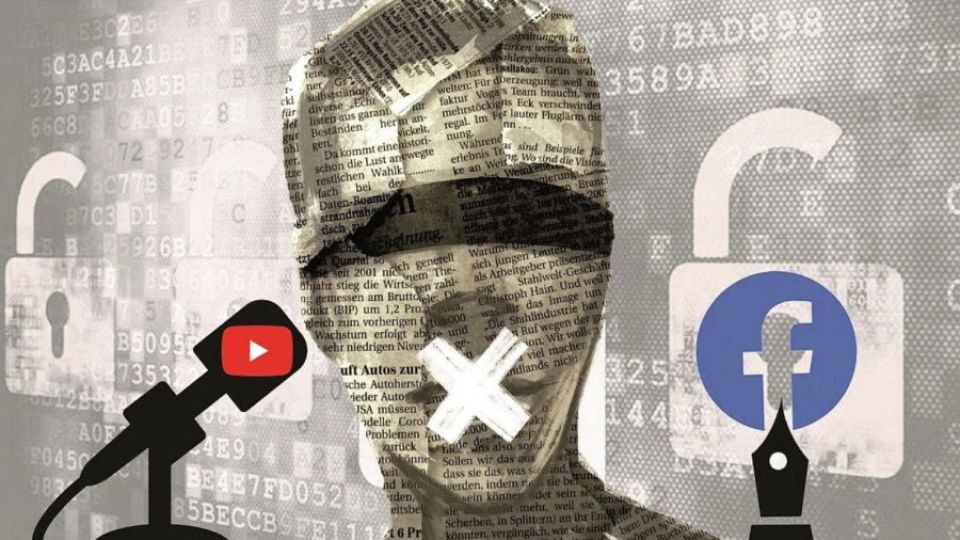
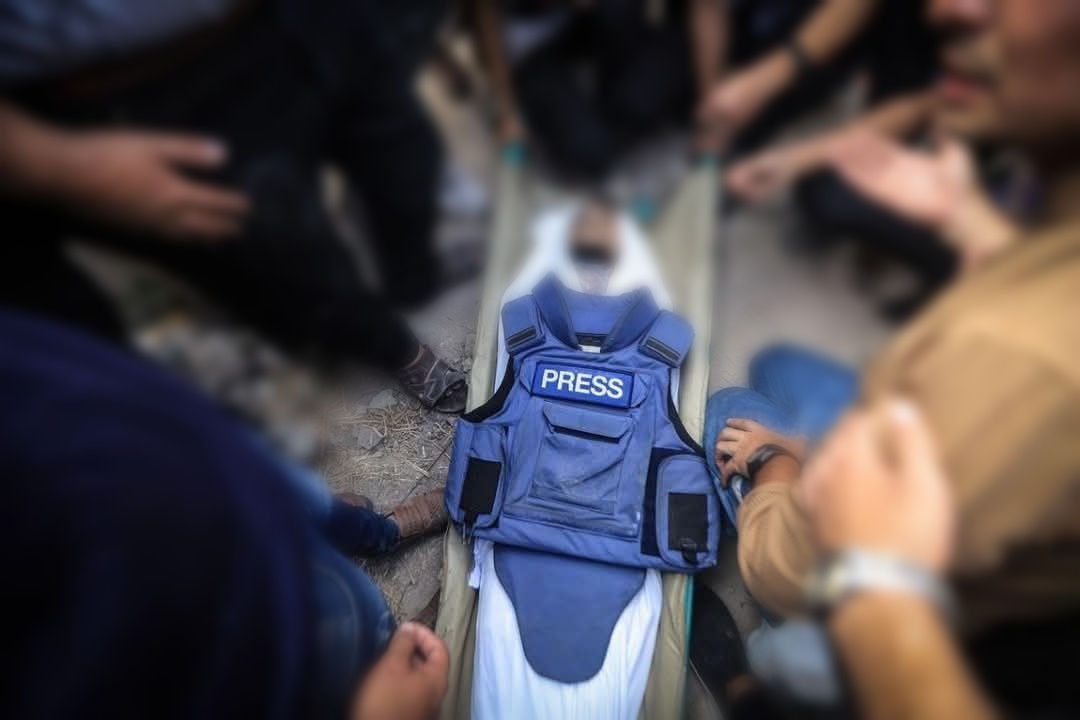
Leave a Reply